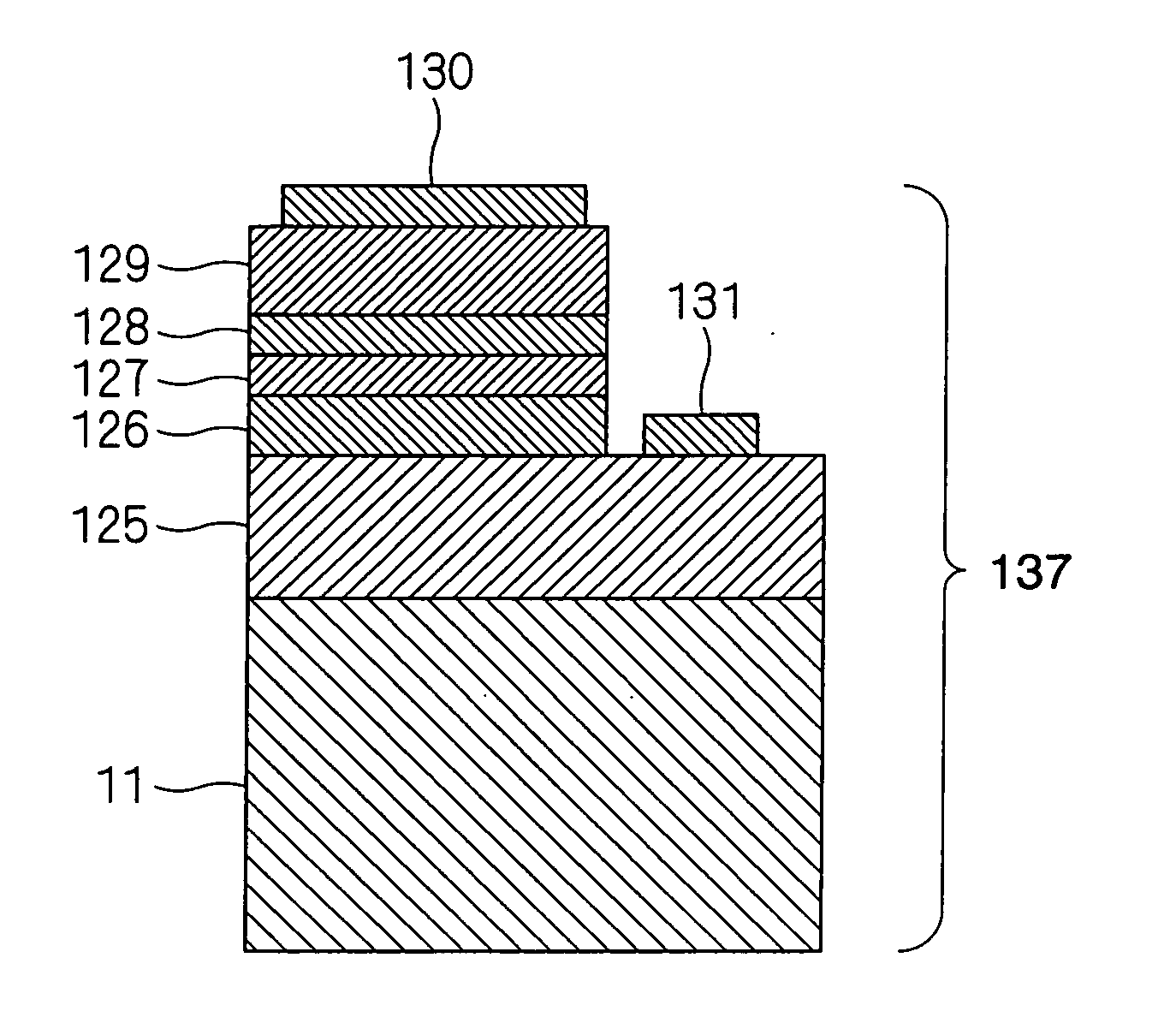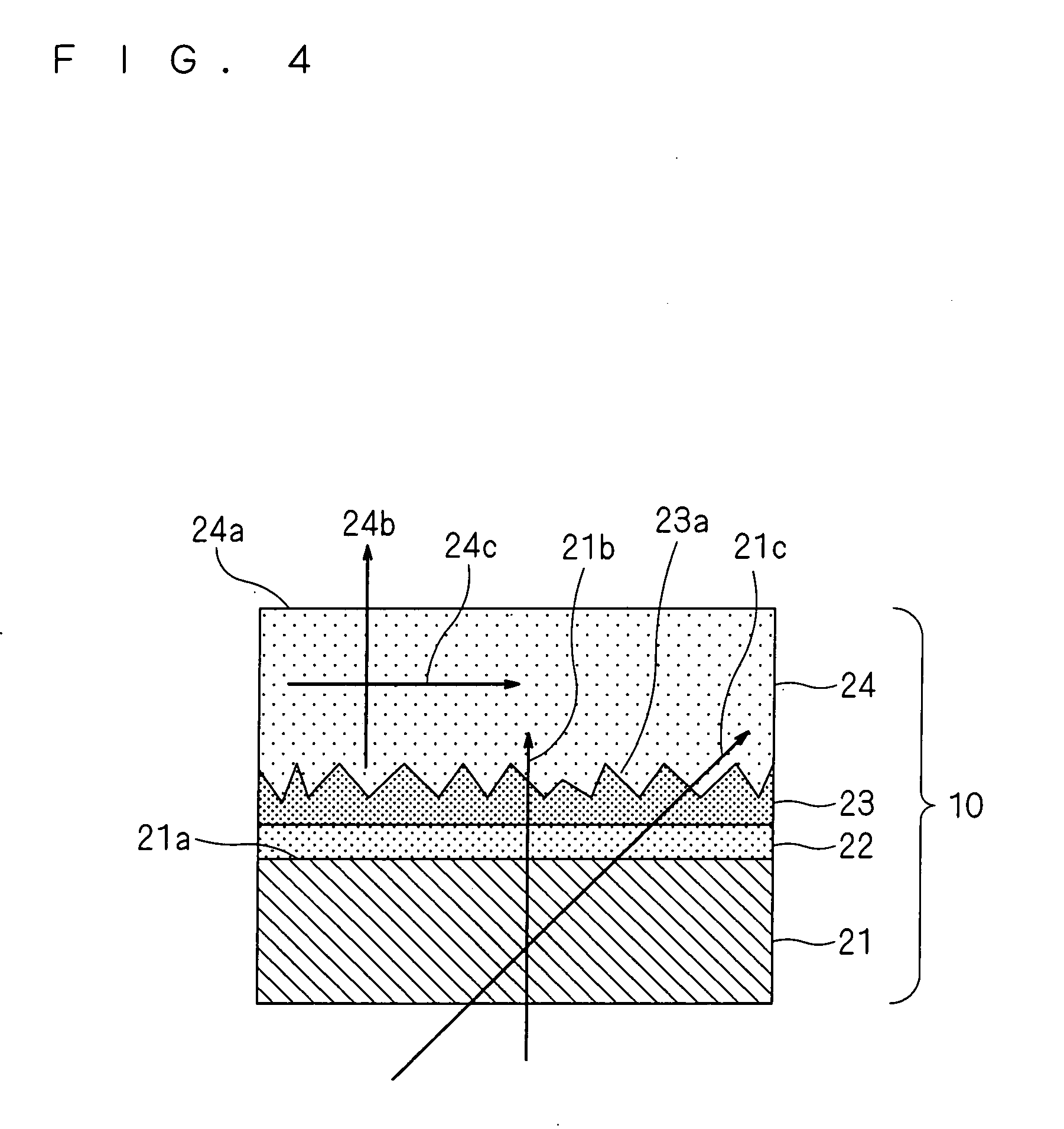Sapphire substrate, epitaxial substrate and semiconductor device
- Summary
- Abstract
- Description
- Claims
- Application Information
AI Technical Summary
Benefits of technology
Problems solved by technology
Method used
Image
Examples
first embodiment
[0064]FIG. 1 is a schematic sectional view showing an epitaxial substrate according to this embodiment. As shown in FIG. 1, the epitaxial substrate 1 has a stacked layers structure 12 comprising a base layer 121, a channel layer 122 and a barrier layer 123 formed successively on one of the principal surfaces of a semiconductor growing substrate 11 made of sapphire. The base layer 121 is formed from aluminum gallium nitride where molar ratio x of AlN is in a range of 0.5≦x≦1.0. The channel layer 122 is formed from GaN or GaInN. The barrier layer 123 is formed from AlGaN.
[0065] The stacked layers structure 12 made of nitride semiconductor is formed so that [0001] axis (denoted as d in FIG. 2, hereinafter referred to as C axis) is oriented parallel to the principal plane of the semiconductor growing substrate 11.
[0066] As shown in FIG. 2, the angle between one principal plane of the semiconductor growing substrate 11 and (01-12) plane of sapphire (denoted as “b” in FIG. 2) is the off...
second embodiment
[0087]FIG. 4 is a sectional view showing an epitaxial substrate according to a second embodiment of the present invention. This epitaxial substrate is manufactured by forming a base layer22 and a first layer 23 successively on a principal plane 21a of the sapphire substrate 21 that has the principal plane on (01-12) plane (hereinafter referred to as R-plane sapphire substrate 21) by the MOVPE method. The first layer 23 receives a strain from the base layer 22, and therefore has the sectional plane thereof spontaneously generating irregular surface configuration 23a having period in a range from 10 nm to 20 μm and height in a range from 10 nm to 10 μm during crystal growth. Then a second layer 24 is grown so as to make the irregular surface configuration 23a formed on the first layer 23 smooth. As a result, root mean square surface roughness (hereinafter RMS) of the surface 24a of the second layer 24 becomes less than 10 nm. In case the irregular surface configuration 23a is not smoo...
third embodiment
[0106]FIG. 7 is a sectional view along the (11-20) plane that is the A plane of a sapphire substrate 35 of this embodiment. Accordingly, [0001] (denoted as c in the figure), that is the C axis, is inclined from the principal plane 36 of the sapphire substrate 35. The sapphire substrate 35 of the present invention has the principal plane 36, that is the R plane, inclined from (01-12) plane toward (0001) plane.
[0107] Definition of the off-angle α of inclining the (01-12) plane toward (0001) plane in the present invention is as follows. Off-angle α is the angle between the principal plane 36 of the sapphire substrate 35 and the (01-12) plane of sapphire. Since [0001] of sapphire which has hexagonal crystal system is uniquely determined, an Off-angle of the (01-12) plane approaching (0001) as denoted by “a” in the figure is defined as positive. On the other hand, an Off-angle of the (01-12) plane moving away from (0001) as denoted by “a′” in the figure is defined as negative.
[0108] Th...
PUM
 Login to View More
Login to View More Abstract
Description
Claims
Application Information
 Login to View More
Login to View More - R&D
- Intellectual Property
- Life Sciences
- Materials
- Tech Scout
- Unparalleled Data Quality
- Higher Quality Content
- 60% Fewer Hallucinations
Browse by: Latest US Patents, China's latest patents, Technical Efficacy Thesaurus, Application Domain, Technology Topic, Popular Technical Reports.
© 2025 PatSnap. All rights reserved.Legal|Privacy policy|Modern Slavery Act Transparency Statement|Sitemap|About US| Contact US: help@patsnap.com



